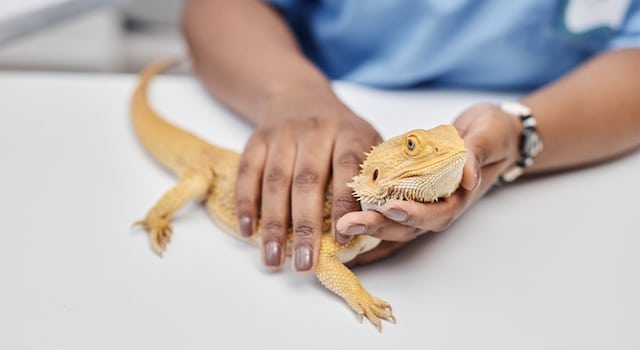
Introduction to Bearded Dragons Vomiting
If you have ever witnessed your bearded dragon throwing up, you probably feel concerned or confused about why they are doing it. As with most pets, vomiting is a clear sign that something could be wrong with your bearded dragon, whether health or husbandry issues. Unfortunately, it can also quickly become a very serious issue because it makes them prone to dehydration.
It’s essential to understand why your bearded dragon is throwing up in the first place. Throwing up blood or thick mucus usually indicates a serious health issue, whereas throwing up water or regurgitated food is generally less of a concern.
But what signs should you look out for, and what should you do if your bearded dragon is vomiting? This detailed article will tell you everything you need to know.
What Does Vomiting Look Like in Bearded Dragons?
Bearded dragons vomit similarly to humans and other pets, such as cats and dogs. They will start heaving and throwing up the contents of their stomach, often accompanied by lethargy, labored breathing, or black bearding.
Their vomit can appear differently depending on what they last ate or drank, but it generally looks like a yellowish liquid (bile). If they have recently eaten, bits of undigested food might also be mixed in with the bile. It’s also common to appear very watery or clear if they have recently drunk a lot of water. Sometimes, the vomit may have a foul smell or contain mucous or saliva, giving it a thicker consistency.
Vomiting should not be confused with regurgitation or aspirating, which are slightly different. Regurgitation is when the undigested contents flow from the throat or esophagus and into the mouth without any forceful contractions or nausea. This usually occurs right after bearded dragons have eaten or drunk something that hasn’t been sitting in their stomach for a while.
Aspiration happens when the contents are inhaled into the airways or lungs. This can be dangerous because the contents could cause inflammation and infection in the lungs, leading to aspiration pneumonia.
Common Causes of Vomiting in Bearded Dragons
- Overfeeding: Bearded dragons might vomit shortly after eating if they have eaten too much food at once or food that is too large for them to digest properly. This is a fairly common reason and isn’t a concern if it doesn’t happen often.
- Improper Diet: Feeding foods that are difficult to digest, such as high-fat insects, unsuitable fruits and vegetables, or insects with hard exoskeletons.
- Incorrect Temperatures: Bearded dragons are ectothermic (cold-blooded) and need external heat to digest their food correctly. Their ideal basking temperature range is between 107-113°F (or 42-45°C). Prolonged exposure to cool temperatures could lead to indigestion and cause them to vomit undigested food.
- Dehydration: A dehydrated bearded dragon may vomit thick and sticky mucus due to a lack of fluids. Their digestive system won’t function well, and vomiting is their body’s attempt at expelling irritants from the stomach.
- Parasites: Certain intestinal parasites such as coccidia, giardia, and pinworms can cause gastrointestinal issues like nausea and vomiting.
- Infections: Gastrointestinal infections can cause symptoms such as nausea and vomiting. Intestinal parasites and the Atadenovirus are some common causes of gastrointestinal infections in bearded dragons.
- Foreign Objects: Vomiting is a natural bodily reaction when bearded dragons eat foreign objects that they can’t digest properly and need to expel. This could be substrate, fake plants, or other inedible objects.
- Stress: Excessive stress could lead to digestive issues such as nausea and vomiting. Some common causes of stress include improper handling, loud noises, contact with other pets, aggressive cage mates, or sudden environmental changes.
- Overhydration or Aspiration: Drinking too much water too quickly can lead to vomiting or regurgitation. It could also lead to aspiration if water is inhaled into the airways or lungs, which can trigger vomiting.
When to Seek Veterinary Care
Bearded dragons should be taken to an exotic veterinarian when they seem unwell or start vomiting for an unknown reason to catch potential health issues early on. It might be unnecessary to take them to the vet if they vomit because they overate or drank too much water too quickly, especially if it’s only a once-off situation and they don’t show any other concerning signs.
You should contact a veterinarian if your bearded dragon shows the following signs after vomiting:
- Lack of appetite before or after vomiting lasting for more than a few hours
- Black bearding (a sign of stress)
- Lethargy or weakness
- Sunken eyes or sides
- Panting, mouth gaping, or rapid breathing
- Vomiting more than once in a short period of time
- Vomiting blood or excess mucus
- Diarrhea or changes in bowel movements
Veterinary Diagnosis
The veterinarian will diagnose your bearded dragon based on clinical signs and after running a few tests. They might do fecal tests to check for intestinal parasites that could be responsible for nausea and vomiting. X-rays are done to check for blockages caused by foreign objects or undigested food, and blood tests are used to check for gastrointestinal infections. They will probably ask you about your bearded dragon’s history, diet, and overall care to rule out husbandry issues. Treatment and any necessary medications will be administered after a diagnosis, but the vet will probably administer hydration treatments (such as intravenous therapy) to prevent dehydration for the time being.
Immediate Steps to Take if Your Bearded Dragon Throws Up
The first thing you should do after your bearded dragon vomits is move them to a safe place if they are outside their enclosure, under the hot basking lamp, or on a high platform to prevent falls. They will likely feel slightly weak and disorientated for a few minutes afterward and need time to recover in a comfortable and safe area.
If possible, you should try to get a sample of the vomit in a secure container or Ziploc bag in case you need to take it to a vet. This is a good step to take so that the veterinarian can check the vomit for parasites, foreign objects, or other stomach contents that might be causing the vomiting.
Bearded dragons lose a lot of fluids and electrolytes when vomiting, making them more prone to dehydration. Ensure they have access to fresh, clean water nearby to drink. The veterinarian may also suggest giving electrolyte solutions to prevent or treat dehydration.
Your bearded dragon might not have much appetite after vomiting, especially if they feel unwell or have intestinal parasites or infections. However, you should still ensure they have soft, easily digestible foods. You want to avoid giving fatty foods or insects with thick or hard exoskeletons, as they can be challenging to digest. Hydrating foods like cucumber are great for hydration. You can also offer dandelion greens, collard greens, pumpkin, kale, and squash.
And lastly, monitor their behavior and consult with a veterinarian if you notice any additional vomiting, diarrhea, or lethargy.
Preventing Vomiting in Bearded Dragons
Feed Properly and Avoid Overfeeding
Adult bearded dragons are omnivores and require a diet consisting of fresh leafy greens, vegetables, and feeder insects. Ensure the insects are no larger than the space between their eyes to prevent choking and digestive issues, which could lead to vomiting or regurgitation.
Avoid feeding the wrong types of food, like fruits, large insects with thick exoskeletons, or overfeeding fatty foods like mealworms and superworms. Follow your bearded dragons’ age-appropriate feeding portions and schedules to prevent overfeeding or excessive weight gain.
Maintain Correct Tank Conditions
Bearded dragons rely on external warmth to maintain a healthy digestive system, so make sure to provide a proper temperature gradient with basking and cool areas throughout the enclosure. They need access to a basking area for at least 12 hours daily with a temperature range of 107-113°F (or 42-45°C). They should also be able to move to a cool side with a temperature range of 77-84°F (25-29°C) so they don’t overheat.
Choose the Right Substrate
It’s common for bearded dragons to occasionally ingest tiny amounts of substrate when they’re hunting or eating. This is why choosing the right substrate is essential to prevent digestive issues. Fine sand or soil usually doesn’t cause any problems if they are occasionally ingested, and you can also place tiles in the feeding areas to prevent this issue entirely. Offering leafy greens and veggies on a small ceramic plate or reptile feeding bowl can prevent them from picking up pieces of substrate that could be accidentally ingested.
Regular Veterinary Check-Ups
Taking your bearded dragon for regular veterinary check-ups helps detect potential health issues like intestinal parasites or infections early on. Early treatment gives your bearded dragon a better chance of recovery. Also, it helps to keep vomiting and nausea under control, which is essential for preventing dehydration or serious health complications.
Common Misconceptions About Vomiting in Bearded Dragons
1. It’s normal for them to vomit during shedding
Shedding does not typically cause vomiting, although it can cause a bit of lethargy or irritability. If your bearded dragon is vomiting while shedding, something else could be wrong, such as dietary problems, intestinal parasites, or infections. You should take them to the vet if it happens regularly or if they show worrisome signs such as lethargy, lack of appetite, diarrhea, or vomiting blood.
2. Vomiting is the same as regurgitation
Regurgitation differs from vomiting because it refers to ingested contents passing from the throat into the mouth in a fluid motion without any forcible contractions. Regurgitation can happen if you handle your bearded dragon right after eating or drinking a lot of water that hasn’t yet settled in their stomach.
Bearded Dragon Hydration and Digestive Health
Proper hydration helps maintain a well-functioning digestive system and prevents dehydration. Vomiting thick, sticky mucus is a sign of dehydration in bearded dragons. The lack of fluids and an imbalance of electrolytes in the body can cause physical stress and disrupt the natural functioning of the digestive system.
Keeping your bearded dragon hydrated by offering multiple dishes of fresh water throughout the enclosure, feeding moisture-rich foods, and maintaining an ideal humidity range can help prevent dehydration-related vomiting.
Conclusion
Vomiting can be a serious issue for bearded dragons and the result of either improper care or health issues. The most common reasons include overfeeding, dehydration, intestinal parasites, and gastrointestinal infections. This can easily be prevented by proper care and regular veterinary check-ups.
If your bearded dragon is vomiting blood, thick or sticky mucus, and shows signs of lethargy, lack of appetite, diarrhea, or sunken eyes, they should be taken to a veterinarian immediately. Bearded dragons can quickly dehydrate from frequent vomiting, so keeping them hydrated with the help of a veterinarian is essential until a proper diagnosis can be made.



